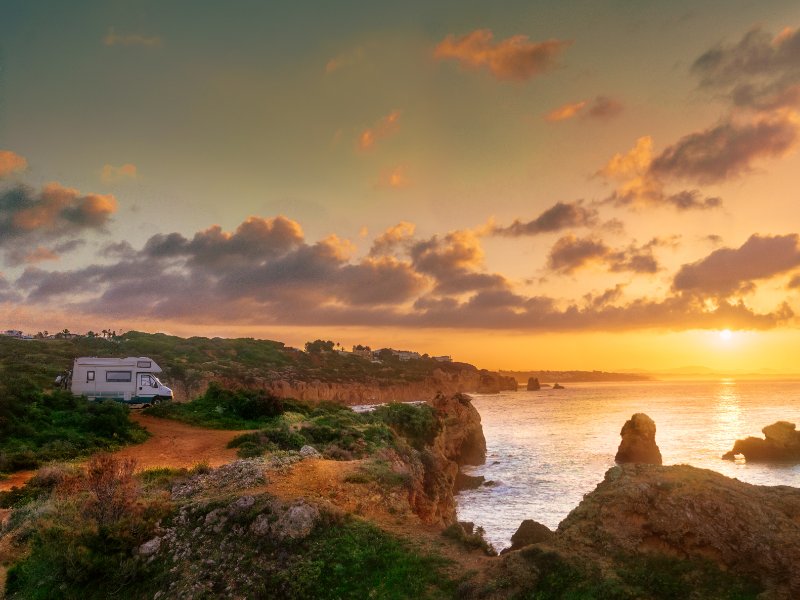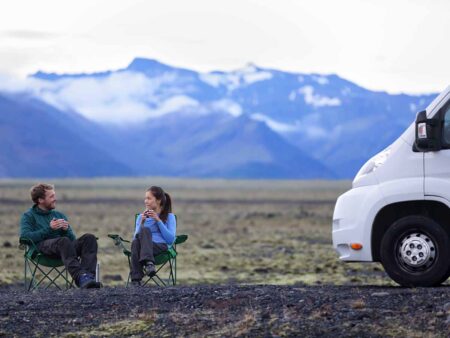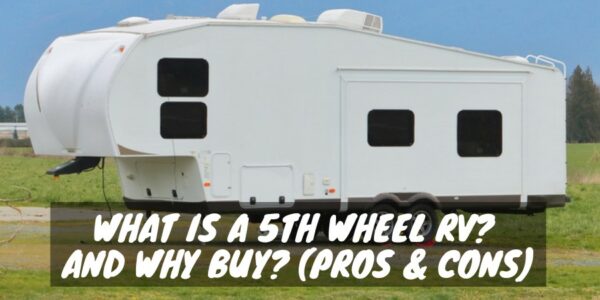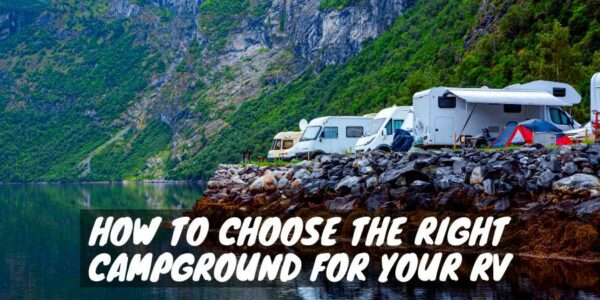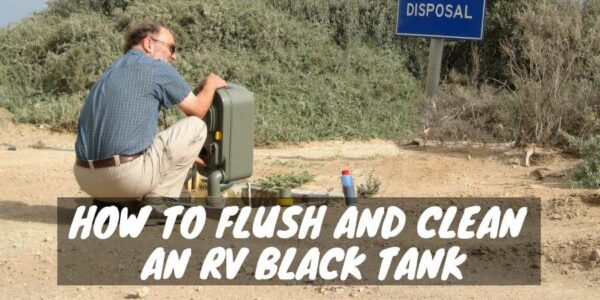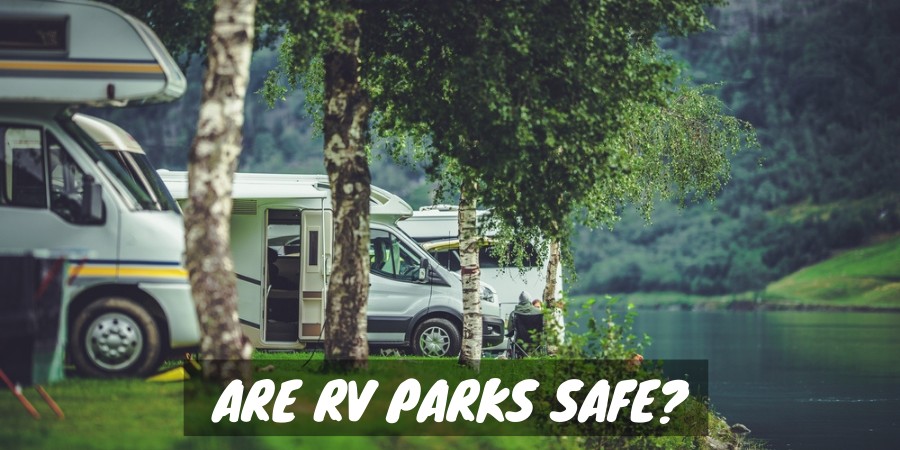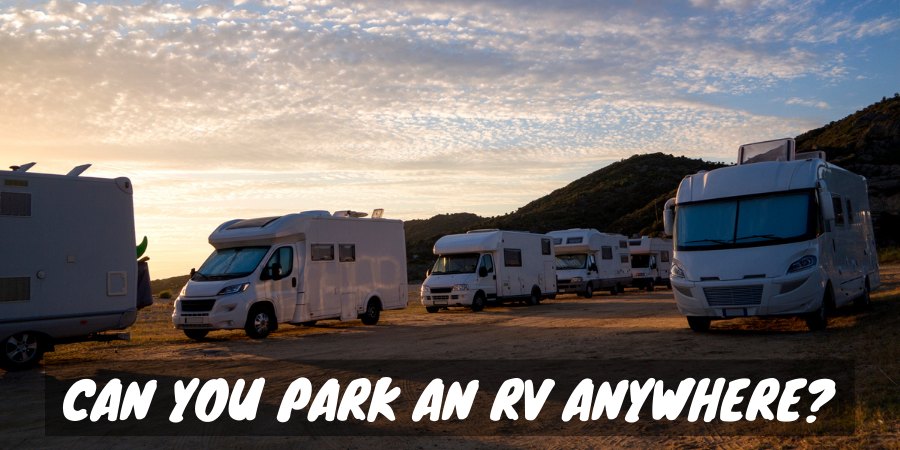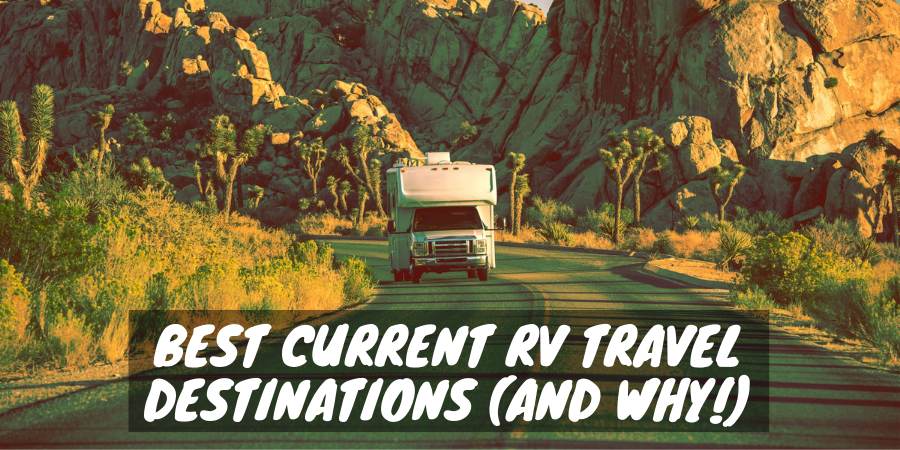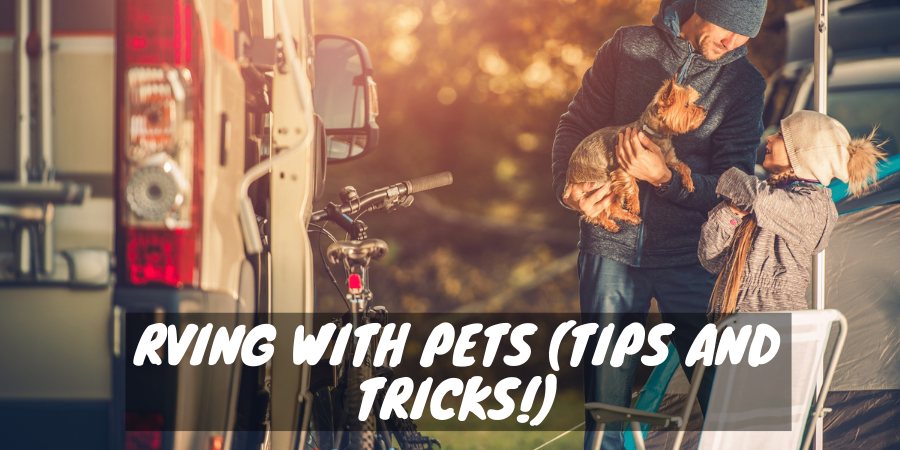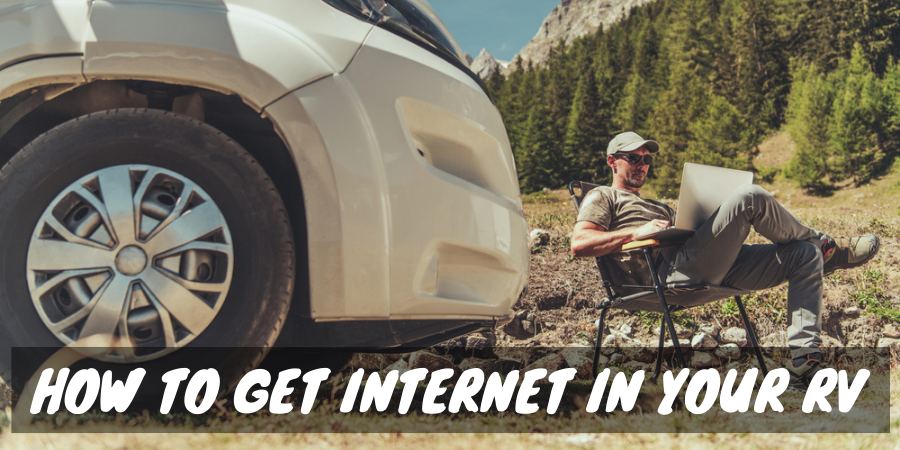Boondocking is a way of life for many RVers, but how do you know if it’s right for you? From Walmart parking lots to camping on remote BLM land, boondocking locations vary widely.
Camping without the amenities of a private RV park or state or national campground does come with some perks, namely a free or low-cost campsite and less noise and crowds. However, there are also disadvantages to consider, which is why I detail all the pros and cons of boondocking in your RV in this guide.
Should you boondock, is it safe, and what do you need to know? Stay here to find out!
What Is Boondocking?
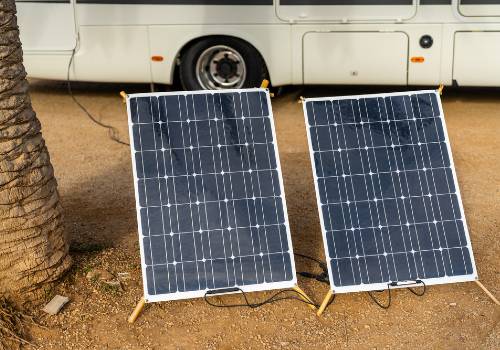
Boondocking is parking your RV and camping without any city power, water, or sewer connections. People who boondock often find ways to create their own power to run lights and appliances, generally by hooking up a gas, diesel, or propane generator or using solar panels and a house battery system.
RVers choose to boondock when they prefer camping in remote areas to enjoy solitude, during long road trips when they don’t want to pay for an overnight stay at a campground, when stealth camping in urban locations, or when a campground’s standard RV sites are fully booked but let you park in the overflow parking area.
RVers use many terms to describe boondocking, such as:
- Dry camping
- Dispersed camping
- Independent camping
- Primitive camping
Boondocking is popular amongst RVers for being free or low-cost, depending on where you choose to camp. BLM and US Fish & Wildlife lands are great places to camp out in nature, and few charge a small permit fee for access.
Newcomers to the RV life are aware of places like Walmart, Cracker Barrel, or Cabela’s letting you park your RV overnight in their lot at no charge, but there are other stores that let you dry camp for free as long as you follow their rules.
Boondocking Pros and Cons
The more you know about the benefits and disadvantages of boondocking, the easier it will be to choose if this type of RV camping is right for you. This list of the pros and cons will clarify what you should and shouldn’t expect when boondocking.
6 Boondocking Pros
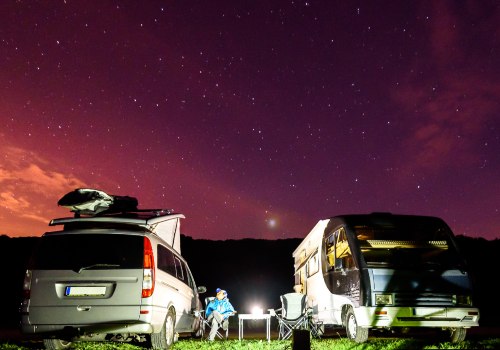
1. Saves Money on Campground Fees
As I stated earlier in this guide, the main reason RVers boondock is to save money. With the average nightly rate of around $55 at a private RV park and $25 on average for state and national park campgrounds, the cost of even a short RV trip can add up quickly.
Dispersed camping options on public lands are entirely free in most instances, and you can camp in one location for up to two weeks in a row. Some states or areas do charge a fee of around $7-$10 a night, which is still much more affordable than traditional campground options; plus, they often include basic amenities like a restroom or potable water.
People who become adept at boondocking, especially out West, where there are endless miles of land for dispersed camping, can go years without paying to park their recreational vehicle.
People who love exploring urban areas and want to take in all the cultural activities and museums without forking over big money for expensive hotel rooms or popular tourist-trap RV parks can stealth camp in small RVs like a Class B campervan or a mini Class C.
Getting a good night’s rest so you can keep driving to your final camping destination doesn’t need to include a hefty charge just to pull into an RV park and sleep. Staying just off the highway in a Cracker Barrel parking lot is free, and you get to use that savings to enjoy a hot and tasty breakfast first thing in the morning right outside your door!
Free lodging for any RVer is a boon. With the rising costs of fuel, maintenance, activities, and food, every penny you can save counts, no matter how big or small your budget.
2. Peace and Quiet
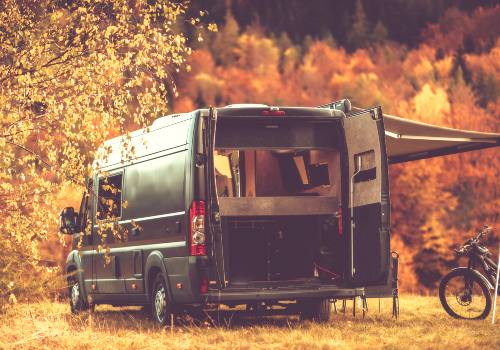
Most RVers fall in love with boondocking because it gives them a chance to break away from the constant commotion and noise found in standard RV parks and campgrounds. With people coming and going in their campers and cars day and night, it can often be less than ideal when you want to kick back, relax, and take in the sights and sounds of the wilderness.
Boondocking on public lands, or even choosing a serene spot through websites such as Harvest Host or Boondockers Welcome, gives you and your RV guests a chance to get away from the crowds to spend some peaceful days in nature. Take long hikes straight from your RV, enjoy surprise encounters with wildlife, or be the only person within miles to take a dip or fish in a quiet stream or lake.
If you want to camp far from other people, boondocking is the best way to do so.
3. No Defined Campsite Sizes or Restrictions
RV campsites in traditional campgrounds are never that large, which means you’ll probably have the next RV only a few feet from the edge of your patio area. However, boondocking gives you the opportunity to find wide-open spaces to park your RV.
It feels glorious not to have the stress of trying to back your large motorhome or travel trailer into a tight campsite and instead pull up any way you want and park to best take in the views.
All the extra space is also ideal when you want to camp with a group of other RVers. You can find a location that can accommodate your party size and have a fun outing with your family or friends and pets without the restrictions of an RV park.
Along with the extra space comes the lack of strangers disrupting your camping vibe. Even in popular dispersed camping locations with designated places to park your RV, the sites are very far apart, so you can enjoy your privacy during your stay.
4. Teaches Self-Sufficiency
Boondocking requires careful planning to ensure you have enough water, power, food, and supplies to get you through the trip and back to civilization. Figuring out what works and what doesn’t for your camping style through trial and error builds confidence.
Many people start slow with boondocking adventures. They may try it for a long weekend and then keep lengthening future trips until they create the best system to ration and replenish supplies efficiently.
Mishaps often occur when dry camping, and you need to find a solution to the problem without the normal means of getting help. When you’re without cell service or many miles from the nearest town, you can’t always call in a technician because the generator won’t start or run to urgent care because you fell and gashed your shin.
People who boondock often become adept and self-sufficient and learn not to panic when things go wrong. Instead, they expect “the unexpected” and work out ways to fix problems without the help of others.
5. Flexible Scheduling
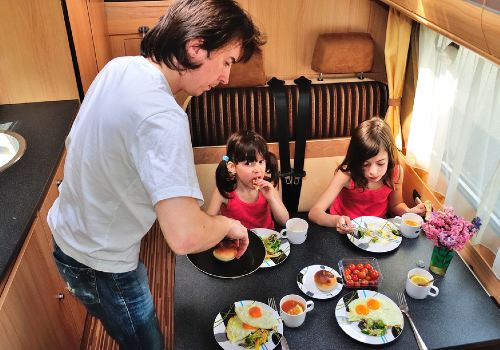
Boondocking lets you travel at your own pace, with no rush to get to a specific campground by a certain time, so you don’t forfeit your reservation and lose your deposit.
You don’t have to up and move campsites after a few days just because someone else booked that spot nine months ago. You can choose to avoid the weekend rush for popular first-come, first-served primitive camping locations and instead arrive mid-week.
You can park your RV, enjoy the area for as long as you like, and move on when you’re ready. Often, you can drive a short distance after two weeks, set up a new camp, and get back to enjoying the great outdoors with little fuss.
RVing is much less stressful when there isn’t money on the line to be lost by not showing up on schedule to an RV park!
6. Boondocking is Wonderful for Families
Family RV trips do not need to be all about the campground pool or having an activities director who will entertain your kids with crafts and games. Keeping kids happy, relatively quiet, and off other campground guests, campsites can get tiresome for parents.
Switching up your camping plans for a boondocking trip can actually be much easier on parents. You don’t have to monitor your kids actions as closely, as there won’t be other campers nearby.
Kids can play, yell, run, explore, and learn new camping and survival skills when there isn’t the distraction of video games, tablets, or TVs that require power to operate. Boondocking is camping in its purest form when you learn to be a steward of this land and enjoy the beauty and wonders it provides.
Staying active and entertained while boondocking is easier than you think. Many of the best boondocking locations are in Arizona, Wyoming, Colorado, Utah, and California and near recreational areas where you can hike, ride horses, fish, swim, boat, visit historic landmarks, and so much more.
5 Boondocking Cons
Boondocking has its drawbacks and is not for everyone. Here are the deal-breakers for many RVers:
1. No RV Hookups
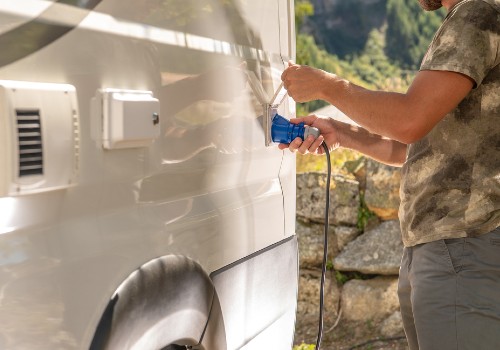
Part of what you pay for at a standard campground is connecting to water, power, and sewer lines so you can camp with the comforts of home.
Being able to have an unlimited and clean water supply, enough power to run your air conditioner when it’s hot, or to use your RV bathroom and have a tidy way to dispose of wastewater from your tanks are things that will be sorely missed when you boondock.
Boondocking requires thoughtful planning to ensure each person has enough water for hygiene tasks and to cook and drink each day. The same goes for food and other personal needs, along with dealing with trash and human waste in an environmentally-friendly way.
For many people, handling the logistics of boondocking is overwhelming and not worth the effort. Properly setting up your RV for boondocking often takes a hefty initial investment, as solar power systems or powerful generators do not come cheap.
2. No Campground Amenities
If your RV has a bathroom with a shower, I guarantee it isn’t the most comfortable space to use, and running out of hot water is a continual battle. However, many recreational vehicles, like teardrop campers or pop-up trailers, don’t have a bathroom, so pulling into a campground with restrooms with flushing toilets and shower houses with endless hot water is downright luxurious.
You aren’t going to find a laundromat, camp store, swimming pool, basketball court, or a propane filling station out on BLM lands, nor at a Walmart parking lot. So keep that in mind if you’re used to or must have convenient access to amenities while RVing.
3. Camping Locations Can Be Well Off the Beaten Path
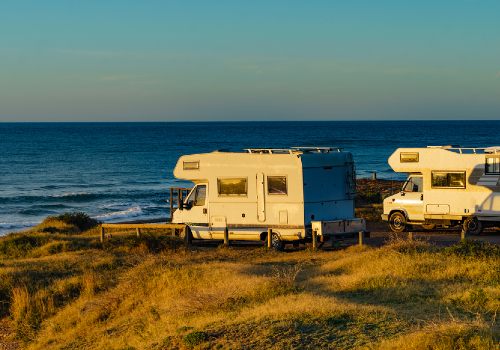
Most dispersed boondock camping locations are remote and will require you to traverse unpaved roads, sharp turns, deep ruts, or other perils that make reaching your destination challenging.
You may require your RV to be lifted for extra clearance or have all-terrain tires installed. Your large rig may be too long to easily navigate winding roads or pass under low-hanging branches.
Want to Connect With a Community of Over 1,078 RV Enthusiasts?
You will be able to find wonderful boondock campsites for any type of RV, but it takes time to build up your list of the places you can access safely.
If you’re trying to save money by boondocking outside of major tourist areas so you can enjoy the restaurants, museums, and entertainment they offer, please remember that you’ll be spending a lot of time and fuel driving from your remote campsite to reach the action. Paying for a campground in the heart of a city is often much more cost and time-efficient.
4. Weak or No Cell or Internet Service
Once you leave the main highways and venture into more rustic locations, cell phone service and Wi-Fi signals can become erratic or fail to exist at all. You may find not having the ability to call for help in an emergency or even check in on Facebook to be too much to handle.
Luckily, major carriers such as Verizon offer great coverage areas, but even they lack service in large areas out West. Bringing along a hotspot or setting up satellite internet isn’t always going to work.
The best way to prepare for any boondocking trip is to assume you will be out of touch for the duration when heading out into the wilderness to camp. Always leave an itinerary of your plans and locations with a trusted person, along with when you will check in with them to let them know you are okay.
5. No Guarantee of a Campsite
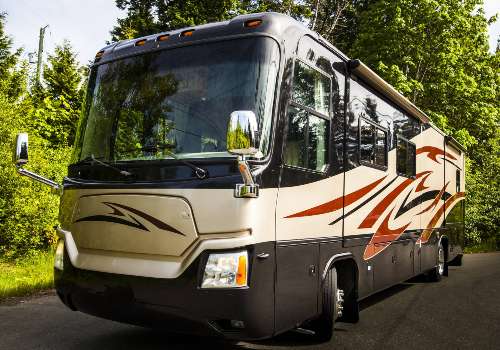
Most boondocking campsites do not accept reservations. You drive in and hope an open spot is available that can fit your RV.
With first-some, first-served campsite occupation standards on most public lands, it can lead to distress when you’re exhausted and just want to park and set up camp, but nothing is open.
You can have this issue with overnight stays at Walmart or other retail centers that you assume (or read online) allow RVs to dry camp in their parking lot.
Unfortunately, each store or locality has rules pertaining to RV overnight parking, and more and more are forbidding it entirely or limiting the number of campers they let park each night.
You will have to research or call ahead to a ranger station or store manager to ensure you’ll have a place to park when you arrive, no matter where you want to boondock.
Is Boondocking Safe?
I’ve been RVing full-time for over a decade and have yet to have a boondocking experience where I felt unsafe. Camping in remote locations is always risky, but with the proper preparation, it’s as safe as any other option.
However, if you ever feel uneasy about parking in a certain location, please trust your gut and move on to a better place.
Do Thieves Target Boondockers?
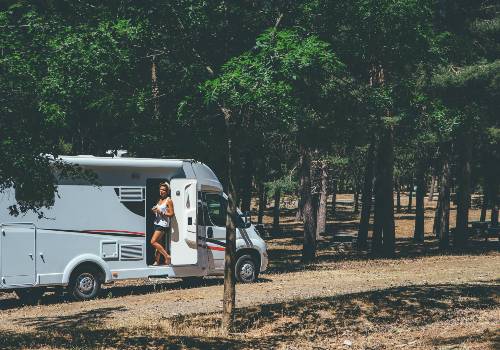
People who steal are looking for items of high value to sell. Most will look to break into homes or cars in a nice area of town and not bother with recreational vehicles full of low-value items when the boondocking occupants are inside or may show up unexpectedly.
Thieves will target items left outside your RV overnight if you boondocking long-term in a dispersed campsite or even within a busy RV park. High-value camping equipment like bikes, kayaks, SUPs, boats, or ATVs needs to be locked up when not in use.
Lastly, experienced thieves know that the majority of RVers carry a weapon and aren’t afraid to use it if they feel threatened.
In general, the further you are from civilization while boondocking, the safer you are, which may put your mind at ease.
Final Thoughts
Is boondocking right for you? It depends on how much you enjoy getting away from it all, and that includes hot showers, internet access, and the easy ability to run to a store to restock supplies.
However, if you love things like long hikes across uninhabited lands, stunning views from your RV windows, learning to be self-sufficient, and not paying nightly campground fees, these are some of the things you can enjoy when you choose to boondock.
The final decision is up to you!
Boondocking 101 – a Guide to Free Camping in Your RV (Video)
"Man cannot discover new oceans unless he has the courage to lose sight of the shore."
-- Andre Gide

